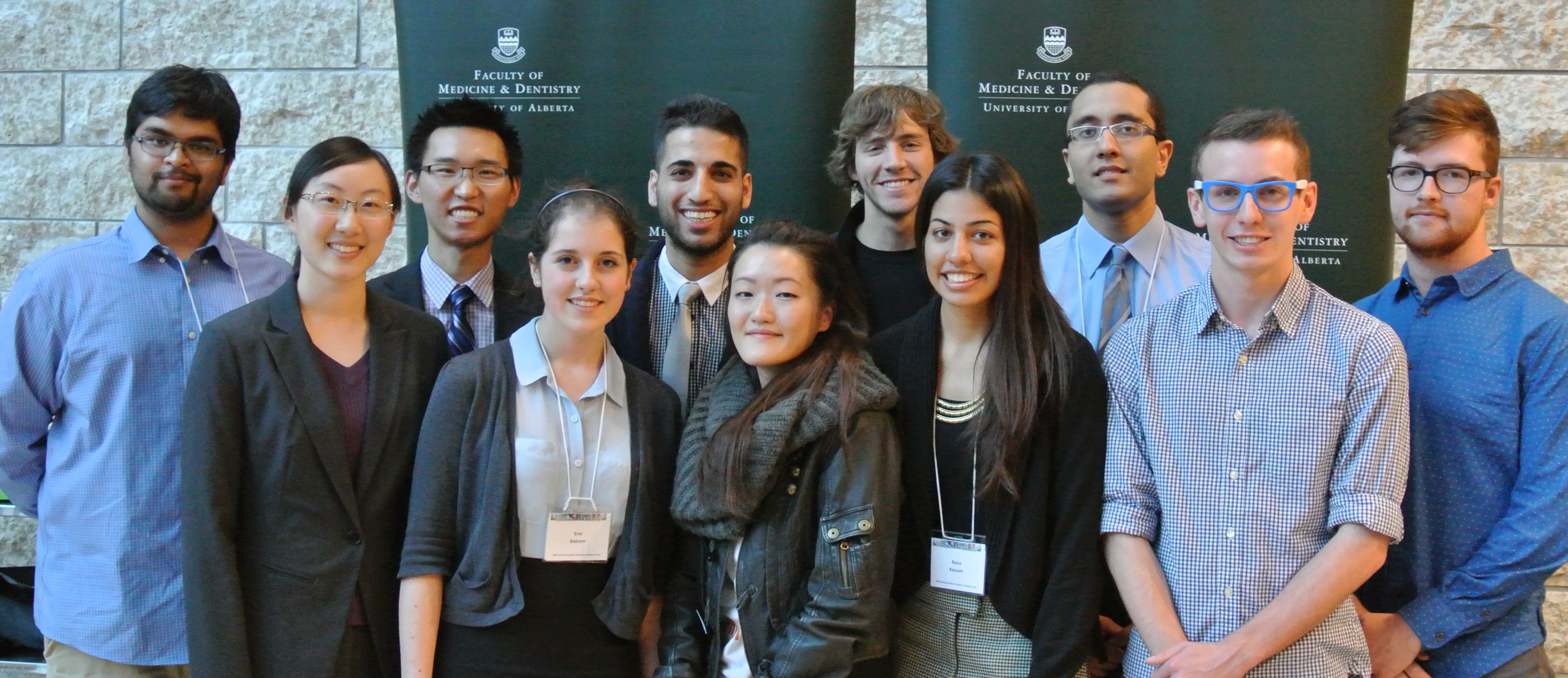
Participants of the 46th annual Summer Students' Research Day.
UPDATE: April 30, 2014
At the National Student Research Forum on April 24 - 25, 2014, Jennifer Ortynski and Amit Persad were both successful with their presentations, bringing home a total of three awards: Ortynski won the Best Poster Presentation Award in the humanities category and the Excellence in Research Award, while Persad won the 2nd Best Overall Oral Presentation Award.
Two undergraduate medical students are heading to the Lone Star State to showcase their summer research projects. Jennifer Ortynski and Amit Persad were chosen from 181 students who participated in the 46th annual Summer Students' Research Day to compete at the annual National Student Research Forum in Galveston, Texas in April 2014.
During the full-day event, participating students were given ten minutes to present and discuss their posters. Judges included faculty members, senior PhD students and postdoctoral fellows.
In seven groups of two, judges evaluated approximately 25 posters. The two highest scoring posters qualified for an award. The qualifying posters belonging to medical students were short-listed for the Galveston competition, which is open exclusively to medical students.
As a student in Roseline Godbout's oncology lab, Persad (MD class of 2017) researched the effects of protein AP-2delta on the axons in the eye. Axons transmit information between the eye and the brain. When there is an excess of the protein, axons grow in clusters due to a disruption of the adhesion molecules that normally cause the axons to grow in a single layer. When the protein is completely absent, one of the brain centres that integrates information from the eye is also entirely absent. Godbout's group believes this is also caused by disrupted adhesion molecules promoting the irregular axon growth and direction, though further investigation is required. Persad was funded through an Alberta Innovates - Health Solutions Summer Studentship Award.
Persad admits that he wasn't expecting to win, despite his history with research. As an undergraduate biochemistry student, he had worked with Godbout prior to entering medical school. As a high school student, he had also participated in a program to engage youth with laboratory science.
"After they went through the first 12 prizes I had pretty much given up, especially since Erin [Balcom], who was also from my lab, had won a prize," he said. Persad originally planned to deliver a 10-minute presentation and had to rush to fit everything into the allotted time. "I was thinking, 'Maybe next time. Maybe I wasn't clear enough and I can prepare for a proper length next time.' Then they called my name and I just had this moment of shock."
Ortynski (BSc '12, MD class of 2016) shared similar surprise.
Ortynski is a student co-ordinator for FIFE S.T.A.R.S. (Feelings, Ideas, Functions, Emotion: Students Taking Academic Review Sessions), a student-led initiative that gives medical students more exposure to history taking and physical examination skills. FIFE represents key points in a patient interview. During formal meetings, participants work through student-written scenarios that are peer reviewed and approved by physicians before use. The project was funded through the Emerging Leaders in Health Promotions Grant and supervised by Laurie Mereu, a professor in the Department of Medicine.
"We didn't actually think FIFE S.T.A.R.S. would win," Ortynski said. "What may have caught the judges' eyes was that it is entirely student run, student formulated, student executed. We did all the surveys, the statistics, the data all ourselves, and the idea was our own." She also noted that student co-ordinators teach first-year students how to conduct the program for the following year, making it entirely student dependent.
Third-year medical students Emeka Nzekwu and Thomas Fung founded FIFE S.T.A.R.S. in 2011 when more than 70 per cent of medical students indicated in a survey that they would like more practice taking histories. Following the first year of operation, more than 95 per cent of respondents felt FIFE S.T.A.R.S. addressed the curriculum gap. Ortynski hopes the initiative will gain an online presence in the near future.
"I thought it was an important idea. If all students are feeling this way, maybe I can help provide some practice for the students while also pushing it forward into the curriculum and Faculty," she said of her attraction to the project.
Nearly 200 undergraduate students take part in the Summer Students' Research Program each year, making it one of the the largest of its kind in Canada. Students are funded through a variety of sources and include granting agencies, Alberta Innovates - Health Solutions, the VP Academic, the Northern Alberta Clinical Trials and Research Centre and FoMD endowments.
In addition to Persad and Ortynski, 12 other students were also awarded prizes for their posters - see the complete list here.